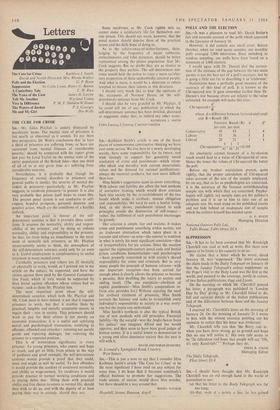l iaim Letters The Cure for Crime Kathleen J. Smith,
David and Norah Henschel, Mrs. Rhoda Walker
Polls and the Election G. P. II yell Suppression Sir Colin Coote, Henry G. Button A Canterbury Tale C. H. Rieu The Years of the Lion James H. Lawrie Tell Me Another 'Wayland Young Vive la Difference P. M. T. Sheldon-Williams The Waters of Jordan P. S. Gourgey Me and My Girl Dee Wells
THE CURE FOR CRIME SIR,—Mr. Giles Playfair is unduly dismayed by psychiatric terms. The mental state of prisoners is not nearly so abnormal as it sounds. To put them into perspective, Dr. West's conclusions that `at least a third of prisoners are suffering from, or have not recovered from, • mental illnesses of considerable severity,' should be compared with the report given last year by Lord Taylor on the mental state of the entire population of the British Isles—that one third of all of us at any given time ar:. suffering from considerable neurosis.
Nevertheless, it is probable that though the frequency of mental disorders in prisoners and general public is similar, the severity of mental dis- orders in prisoners—particularly, as Mr. Playfair suggests, in recidivist prisoners—is greater. It is also very probable that prison itself helps to cause this. The present penal system is not conducive to self- respect, hopeful prospects, personal decision and positive action, which are the conditions of a healthy outlook.
An important point in favour of the self- determinate sentence is that it provides these condi- tions. It assumes the normality, ability and respon- sibility of the prisoner, and by doing so induces normality, ability and responsibility in the prisoner. So that, far from being an impediment to the treat- ment of mentally sick prisoners, as Mr. Playfair unaccountably seems to think, the atmosphere of the self-determinate sentence could only be an asset to it. Useful employment is complementary to useful treatment in many mental cases.
Certifiable prisoners and others too ill mentally or physically to work, would, as I pointed out in my article on the subject, be supported, and have the claims against them paid by the General Compensa- tion Fund; which in turn would be supported by fines levied against offenders whose crimes had no victims : such as those Mr. Playfair lists.
The most important point about the self- determinate sentence, which both Mr. Playfair and Mr. Cook seem to have missed, is not that it requires prisoners to work, but that it enables them by practical, tangible and socially acceptable means, to regain their t.:atus in society. That prisoners should work to pay for their crimes is not merely an economic transaction; it is a useful and satisfying moral and psychological transaction, satisfying to offender, offended and onlooker: restoring not merely goods and repairing damages, but restoring the prisoner to a respected position.
This is of tremendous significance to every prisoner. To young prisoners, who expect and hope sc, much, and get so little, from prison in the way of guidance and good example, the self-determinate sentence would provide a proof that they could, must and might as well be 'useful. To first offenders it would provide the comfort of continued normality and ability as wage-earners. To recidivists it would provide practice in normal working conditions' and in paying debts due : fitting them with practical ability and free choice to return to normal life, should they wish to do so, and with the dignity of at least paying their way in custody, should they not. Some recidivists, as Mr. Cook rightly tells us, cannot make a satisfactory life for themselves out- side prison. This should not mean, however, that the penal system should deprive them of the practical means and the daily hope of doing so.
As to the salters-away-of-stolen-fortunes, these, judging by the frequency of major robberies, embezzlements and false pretences, should be better represented among the prison population than Mr. Cook suggests. But no doubt they are as elusive as the property they purloin. The self-determinate sen- tence would help the police to trace a more satisfac- tory proportion of these undoubtedly talented people. And what is more, it would be a deterrent to others tempted to misuse their talents in this direction.
I should very much like to hear the opinions of the occupants of Norman House on the self- determinate sentence from Mr. Cook.
I should also be very grateful to Mr. Playfair, if he could tell me of any publication in which the „self-determinate sentence has been detailed, discussed or suggested, under that, or indeed any other name.
. KATHLEEN J. snirrit
Fe/in Faesog, Clyn nog, Caernarvotishire






































 Previous page
Previous page